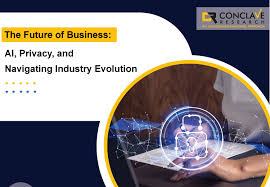The rapid advancements in Artificial Intelligence (AI) are changing the way businesses operate. From improving customer service to optimizing supply chains, AI is reshaping the business landscape. However, as AI becomes more integrated into our lives, issues like privacy and how industries—such as the navigation industry—evolve are also at the forefront of this change. Let’s explore these areas and understand what the future holds.
1. The Future of Business AI
AI is already making waves across various sectors, from healthcare and finance to retail and manufacturing. In the business world, AI helps automate repetitive tasks, improve decision-making, and analyze large amounts of data quickly.
- Automation and Efficiency: AI-powered systems can take over routine tasks such as answering customer queries (think chatbots), managing schedules, or even handling basic accounting tasks. This not only saves time but also reduces human error.
- Personalized Customer Experience: Businesses are using AI to offer more personalized services. For example, when you shop online, AI algorithms can recommend products based on your past purchases or browsing history. This helps companies better understand and serve their customers.
- Data-Driven Decisions: With the help of AI, businesses can make smarter, data-backed decisions. AI can analyze customer behavior, market trends, and operational performance, helping companies fine-tune their strategies and gain a competitive edge.
However, as AI becomes more powerful and widespread, it raises an important concern privacy.
2. The Privacy Challenge
AI systems rely heavily on data. The more data they have, the better they perform. However, this data often includes sensitive personal information, raising questions about privacy.
- Data Collection and Security: Many AI systems collect vast amounts of data, from online browsing habits to personal details like age, location, and even health information. While this data helps improve services, it also creates risks if mishandled or misused.
- Regulations and Ethics: Governments and organizations are increasingly focusing on protecting users’ privacy. Regulations like the General Data Protection Regulation (GDPR) in Europe and the California Consumer Privacy Act (CCPA) in the U.S. have set strict rules on how businesses can collect, store, and use data. The ethical use of AI is now a key consideration for businesses, ensuring that customers’ rights are respected.
Businesses must balance the benefits of AI with the need to protect customer privacy, adopt robust security measures, and comply with data protection laws.
3. The Evolution of the Navigation Industry
One of the industries most impacted by AI and data is the navigation industry. GPS systems, navigation apps, and autonomous vehicles are evolving rapidly, and AI is playing a key role in their transformation.
- Smarter Navigation Systems: AI is making navigation systems more efficient and user-friendly. Modern GPS apps like Google Maps or Waze use AI to provide real-time traffic updates, suggest the fastest routes, and even predict travel times based on historical data. These systems learn from users’ behavior to give personalized route suggestions, making travel easier and more efficient.
- Autonomous Vehicles: AI is at the heart of self-driving cars, a major innovation in the transportation industry. These vehicles use AI to understand road conditions, detect obstacles, and make decisions on the road—all without human intervention. While fully autonomous vehicles are still in development, AI-powered driver-assistance systems like Tesla’s Autopilot are already available, making driving safer and more convenient.
- Privacy in Navigation: With AI-based navigation systems, privacy again becomes a concern. Navigation apps often track users’ locations and travel patterns. Although this data helps improve services, users may worry about how their location information is being used or shared. Companies in the navigation space are being pushed to ensure their AI tools respect users’ privacy.
Also read: Integrating Marketing Research into Design Thinking and Human-Centered Design
The future of business AI looks bright, with the potential to revolutionize industries through automation, personalization, and data-driven insights. However, with these advancements come challenges, especially around privacy and ethical use of data. In industries like navigation, AI is already driving change with smarter systems and autonomous vehicles, but privacy concerns remain critical.
As we move forward, businesses must find ways to leverage AI responsibly, ensuring they deliver innovation while protecting user privacy and maintaining trust. The evolution of these technologies will shape the future, driving both opportunity and challenges in equal measure.
